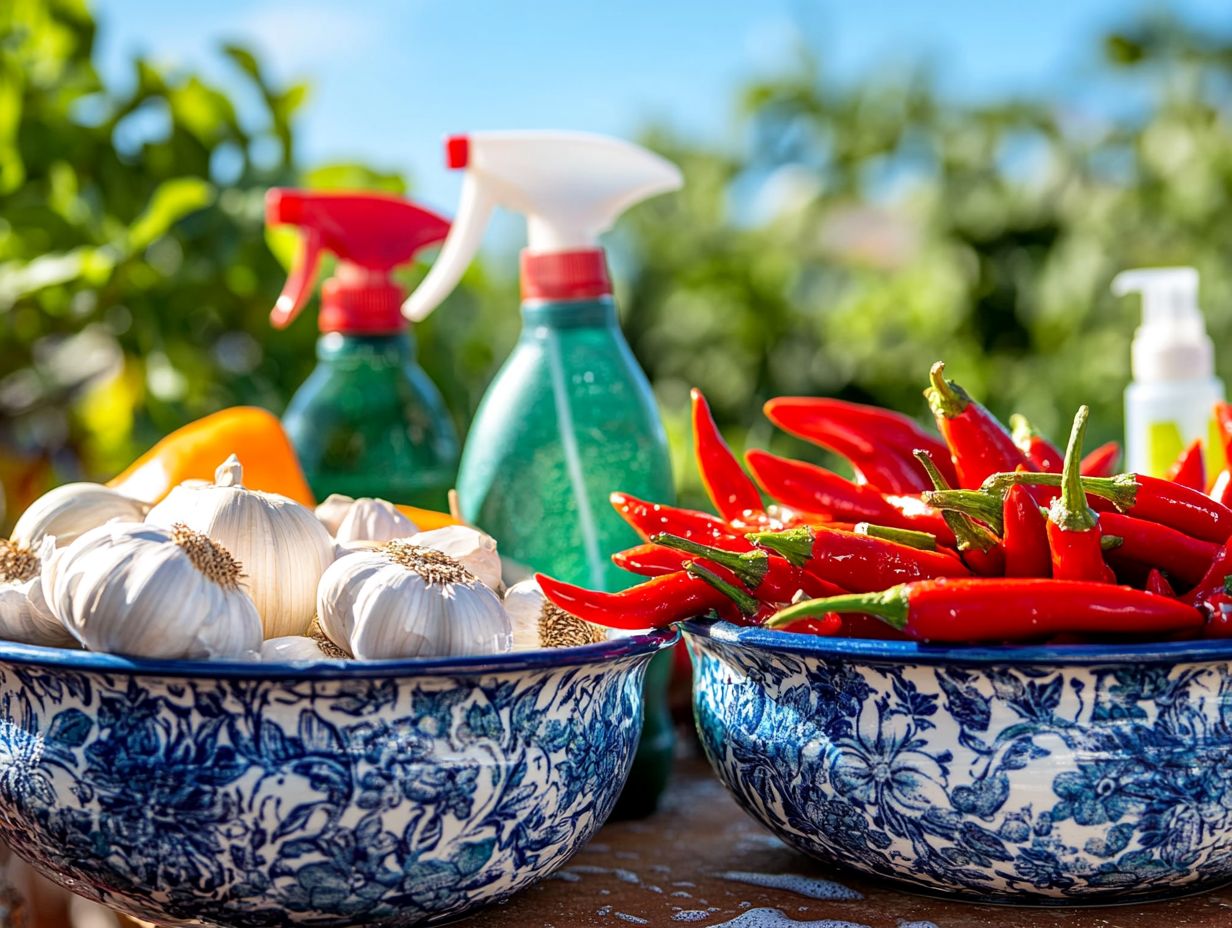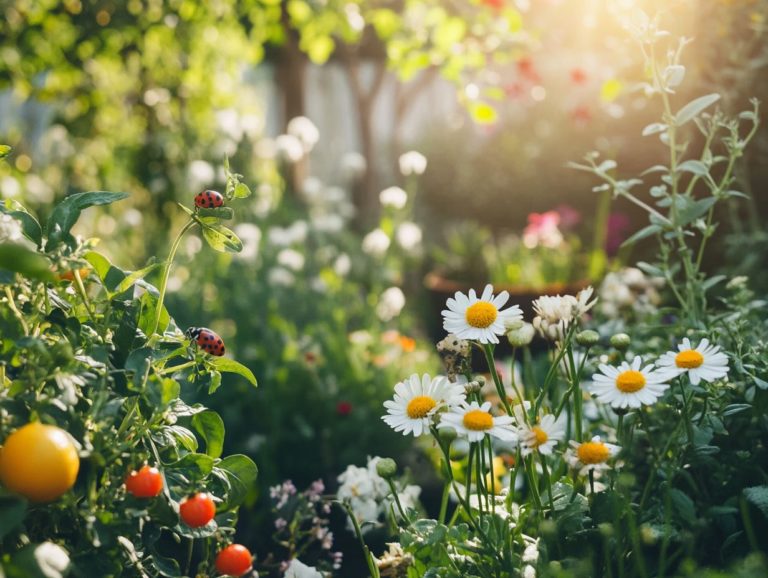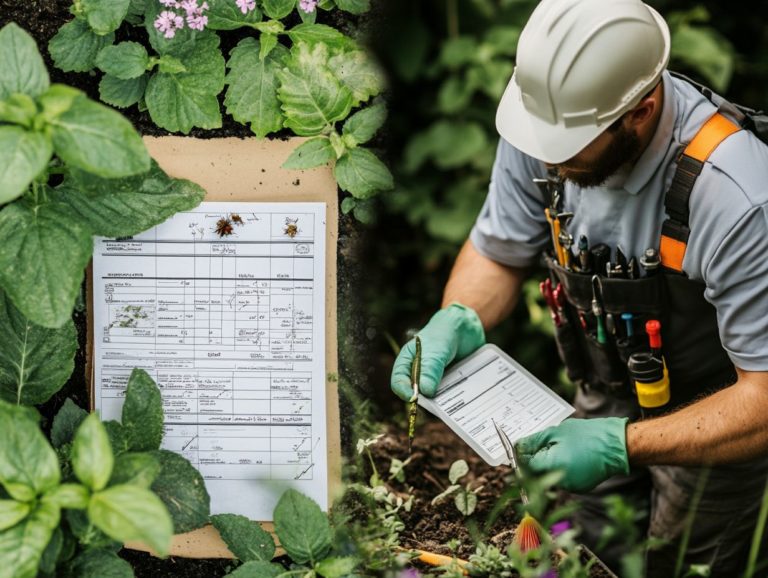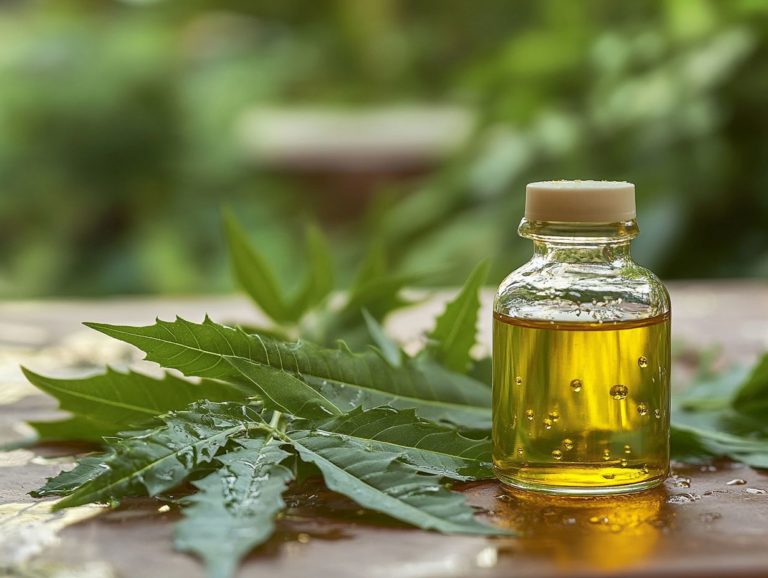5 Homemade Remedies for Common Garden Pests
Gardening can be a truly rewarding endeavor, yet it often presents its fair share of challenges, particularly when it comes to dealing with pests.
You need not resort to harsh chemicals to shield your plants from unwelcome visitors.
Discover five effective homemade remedies such as garlic spray, neem oil, and vegetable oil spray that can naturally combat common garden invaders.
Explore these exciting and eco-friendly methods to protect your garden!
Contents
- Key Takeaways:
- 1. Garlic Spray
- 2. Neem Oil
- 3. Hot Pepper Spray
- 4. Diatomaceous Earth
- 5. Companion Planting
- Common Garden Pests and Their Impact
- Frequently Asked Questions
- What are some homemade remedies for common garden pests?
- Can I use these remedies on all types of common garden pests?
- Are these homemade remedies safe for my plants?
- How often should I apply these homemade remedies?
- Can these remedies be used in combination with each other?
- Are there any other natural methods for dealing with common garden pests?
Key Takeaways:

- Garlic spray is an effective homemade remedy for repelling pests in the garden, as its strong odor deters insects and pests from damaging plants.
- Neem oil, derived from the neem tree, can be used as a natural insecticide to control and eliminate pests in the garden without harming insects that help your garden grow.
- Chile pepper spray made from cayenne or jalapeno peppers can be a natural and safe way to deter pests from damaging plants, as the spicy scent and taste repels them.
1. Garlic Spray
Garlic spray stands out as a remarkably effective and popular homemade insecticide, using garlic’s natural ability to keep pests away. It’s a preferred choice for those passionate about organic gardening.
This method provides non-chemical ways to safeguard your plants while enhancing the garden ecosystem.
To whip up this straightforward spray, simply blend several cloves of garlic with water and let the mixture steep for a few hours or even overnight. Afterward, strain it to remove any solid particles.
This potent concoction proves particularly effective against pesky invaders like aphids and whiteflies, notorious for wreaking havoc on delicate foliage.
Garlic spray avoids harsh chemicals and helps improve soil health, fostering a balanced ecosystem. When applying the spray, remember to target the undersides of leaves where pests often lurk, and keep an eye out for any signs of plant sensitivity, especially with more delicate species.
2. Neem Oil
Neem oil is a remarkable organic pesticide derived from the seeds of the neem tree, celebrated for its ability to repel a wide array of garden pests while ensuring the safety of beneficial insects. This harmonious balance contributes positively to your garden ecosystem.
Neem oil disrupts the life cycle of pests, effectively stunting their maturation and reproductive capabilities, which gradually reduces their populations.
By applying it in a fine mist to affected plants, you ll find that neem oil coats leafy surfaces, thwarting the feeding and mating behaviors of notorious pests like aphids, whiteflies, and spider mites.
The beauty of neem oil is its minimal risk to beneficial insects, such as ladybugs, particularly when you apply it during the early morning or late evening, times when pollinators are less active.
For optimal results, consider integrating neem oil with other treatments, like introducing natural predators and maintaining healthy soil. This comprehensive approach can significantly enhance how you handle pests in your garden.
3. Hot Pepper Spray
Hot pepper spray, crafted from chile peppers, stands out as a remarkably effective DIY pest deterrent thanks to its spicy properties. It s a stellar addition to your arsenal of organic gardening tips, especially when it comes to natural insecticides and non-chemical methods.
To whip up this potent concoction, simply blend fresh or dried hot peppers with water and a touch of dish soap to help the mixture cling to your plants. Once strained, it s ready for action in those vulnerable spots around your garden.
This fiery solution proves particularly effective against pesky invaders like slugs and moles, creating a natural barrier that keeps them at bay.
When you weave this into your broader pest control strategy, it beautifully complements other organic methods, nurturing a healthier ecosystem overall. Just keep in mind the sensitivity of your plants; some varieties may not take kindly to the intense spray. A bit of careful testing and observation ensures that all your garden inhabitants can flourish together.
4. Diatomaceous Earth

Diatomaceous earth serves as a natural, non-chemical method of pest control. It draws on the fossilized remains of tiny aquatic organisms to effectively protect your crops against various pests. It’s a vital part of any organic pest management plan.
This fine powder operates by dehydrating soft-bodied insects such as slugs and aphids, leading to moisture loss and ultimately their demise. You can apply it by simply sprinkling it directly onto affected plants or the surrounding soil, ensuring it remains dry for maximum effectiveness.
Use it sparingly around beneficial insects like ladybugs and bees, as it can unintentionally harm them as well. When using this method, don a mask to prevent inhaling the fine dust. This ensures a safe and efficient approach to your organic gardening endeavors.
5. Companion Planting
Companion planting is a time-honored technique that allows you to strategically pair plants. This practice naturally enhances their growth, deters pests, and attracts beneficial insects. It s essential for cultivating a thriving organic garden ecosystem.
By understanding the relationships between different species, you can create plant pairings that work well together to protect your crops and boost yields. For instance, planting marigolds alongside tomatoes helps repel aphids, while basil near peppers can deter whiteflies. This thoughtful pairing significantly enhances the overall health of your garden.
Pay attention to plant sensitivity, as some plants may compete for resources or negatively impact each other s growth. By fostering biodiversity through careful combinations, you can increase resilience within your garden, creating a stable environment that supports both your plants and the beneficial insects they attract.
Common Garden Pests and Their Impact
Identifying common garden pests like aphids, whiteflies, and slugs is crucial for your pest management strategy. These pests can wreak havoc on your plants by feasting on their leaves, stems, and roots, ultimately leading to diminished crop yields and compromised plant vitality.
Recognizing pest behaviors lets you act quickly and protect your garden from serious damage! For example, aphids often gather on tender new growth, sucking sap and causing wilting. Whiteflies typically hide beneath leaves, leaving behind a sticky residue known as honeydew, which can encourage fungal diseases. Meanwhile, slugs leave a telltale trail of slime as they snack on foliage, resulting in unsightly holes and potentially significant plant loss.
Comprehending these dynamics is essential for crafting an effective pest management plan, especially when you opt for organic pesticides that safeguard beneficial insects and enhance overall garden health.
How Do These Homemade Remedies Work to Get Rid of Pests?
Homemade remedies like garlic spray, neem oil, and diatomaceous earth effectively eliminate pests by disrupting their life cycles, repelling them with strong scents, or inflicting physical damage. Additionally, 5 ways to use vinegar as a pest repellent can be essential components of any pest management plan in organic gardening.
Utilizing these methods tackles current infestations and fosters a balanced ecosystem in your garden. The powerful aroma of garlic spray can deter aphids and spider mites, while neem oil disrupts the hormonal processes of insects, preventing larvae from maturing into adults. Diatomaceous earth serves as a natural abrasive, creating a physical barrier around your plants to guard against crawling pests, thus supporting a non-toxic approach.
Incorporating these remedies encourages biodiversity and reduces your reliance on chemical pesticides, ultimately enhancing the health of your garden. By adopting this holistic approach, you can cultivate a sustainable environment that naturally repels unwanted visitors.
What Are the Benefits of Using Homemade Remedies?

Using homemade remedies for pest control brings a wealth of benefits your way. You’ll enjoy less chemical exposure, which is beneficial not only for you but also for the whole garden ecosystem. This approach promotes the health of beneficial insects and manages pests effectively. For more insights, consider these 5 ways to encourage pollinators and control pests without harming the planet.
These natural solutions foster a balanced ecosystem where pollinators and predatory insects can thrive, enhancing the overall biodiversity of your garden. They are often more cost-effective than conventional pesticides. With just a few common household ingredients like vinegar, garlic, or soap, you can whip up your own remedies. This simplicity saves you money and inspires a commitment to sustainable practices.
Many of these homemade solutions are straightforward to craft and apply, making them accessible for anyone who wishes to cultivate a healthier environment. For instance, utilizing citrus peels for pest prevention can be an effective choice. By opting for these remedies, you contribute to a vibrant garden ecosystem without the harmful side effects often associated with chemical alternatives.
How Can These Remedies Be Made at Home?
Creating effective homemade remedies like garlic spray, hot pepper spray, and vegetable oil spray can be simple and cost-effective. This allows you to take charge of your pest management strategies with natural pest control methods for your garden, helping you control or eliminate unwanted insects or animals while keeping your plants and the environment safe.
By using natural ingredients, you can cut down on chemical pesticides that might harm beneficial insects and contaminate the soil. Each spray recipe is straightforward to prepare and customizable to target specific pest issues in your garden. For more guidance, check out these 5 steps to create a pest-resistant garden. For instance, garlic spray is great for deterring aphids and beetles, while hot pepper spray can fend off an array of unwanted insects.
It’s important to measure your ingredients precisely and mix them thoroughly to maximize effectiveness. When applying, ensure even coverage across the affected areas of your plants. Always perform a patch test first. This avoids any potential damage to your foliage, and remember to store any unused portions in a cool, dark place to extend their shelf life.
Are These Remedies Safe for Plants and the Environment?
Most homemade remedies, when applied correctly, are safe for both your plants and the environment. However, it s crucial to consider the specific sensitivities of each plant. Adhere to guidelines to avoid inadvertently harming the ones you cherish.
The type of plant and its growth stage can significantly affect its response to these natural solutions. For example, seedlings tend to be more vulnerable to adverse effects than their mature counterparts.
Before you spread any new remedy across your garden, it s wise to test it on a small area first. This practice allows you to observe any potential reactions and make necessary adjustments, ensuring your plants remain healthy and vibrant.
By prioritizing organic gardening tips, you can bolster plant health while fostering a safer ecosystem. This ensures that your methods align with the best environmental practices.
What Are Some Other Natural Ways to Control Garden Pests?
Besides crafting your own homemade remedies, there are numerous natural strategies you can employ to manage garden pests effectively. For instance, you might want to follow 5 tips for maintaining a pest-free vegetable garden, which include introducing beneficial insects, practicing crop rotation, and maintaining a diverse array of plants. All of these practices contribute to a balanced and resilient garden ecosystem.
For example, ladybugs are invaluable allies in the garden. These tiny warriors feast on aphids and other pesky invaders, keeping their populations under control. By encouraging these beneficial insects, you not only reduce your reliance on chemical pesticides but also enhance the overall health of your plants.
Implementing crop rotation is another smart tactic. It prevents specific pests and diseases from becoming established in your garden. Planting a variety of plants attracts different beneficial insects, creating a self-sustaining environment.
These organic gardening practices form the cornerstone of robust crop protection. They promote long-term success and harmony within your ecosystem.
Start crafting your homemade remedies today for a healthier, thriving garden!
Frequently Asked Questions

What are some homemade remedies for common garden pests?
Tired of pesky pests ruining your garden? Try these 5 simple pest control hacks for gardeners and watch your plants thrive!
1. Neem oil spray: Mix 2 tablespoons of neem oil with 1 gallon of water. Spray this solution on affected plants to repel pests.
2. Garlic and chili pepper spray: Blend 10 cloves of garlic and 3 hot chili peppers with 2 cups of water. Strain, then add 1 tablespoon of dish soap and spray on plants.
3. Beer trap: Place a shallow dish filled with beer in your garden. This will attract and drown slugs.
4. Saltwater solution: Mix 2 tablespoons of salt with 1 gallon of warm water. Spray on plants to eliminate aphids and spider mites.
5. Vegetable oil spray: Combine 1 cup of vegetable oil with 1 tablespoon of dish soap and 1 quart of water. Spray on plants to smother and kill pests.
Can I use these remedies on all types of common garden pests?
Yes, these homemade remedies can effectively tackle various common garden pests such as aphids, slugs, and spider mites, but you might also consider using plants that repel common garden pests for an eco-friendly solution.
Are these homemade remedies safe for my plants?
Absolutely! These remedies are made from natural ingredients and are safe for most plants. However, it’s wise to test a small area first to ensure there are no adverse reactions.
How often should I apply these homemade remedies?
For best results, apply these remedies every 7-10 days, or after heavy rainfall. This ensures that pests are continuously repelled or eliminated.
Can these remedies be used in combination with each other?
You can use these remedies together! Experiment to find the best mix for your specific pest issue, but avoid excessive use of any one ingredient to prevent plant damage. For a comprehensive approach, consider these 5 steps to reduce pest pressure in your garden.
Are there any other natural methods for dealing with common garden pests?
Yes, other natural methods include companion planting, introducing beneficial insects, and regularly cleaning up your garden to reduce pest habitats.






